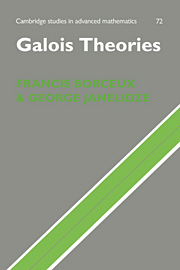Book contents
- Frontmatter
- Contents
- Preface
- 1 Classical Galois theory
- 2 Galois theory of Grothendieck
- 3 Infinitary Galois theory
- 4 Categorical Galois theory of commutative rings
- 5 Categorical Galois theorem and factorization systems
- 6 Covering maps
- 7 Non-galoisian Galois theory
- Appendix: Final remarks
- Bibliography
- Index of symbols
- General index
Appendix: Final remarks
Published online by Cambridge University Press: 11 January 2010
- Frontmatter
- Contents
- Preface
- 1 Classical Galois theory
- 2 Galois theory of Grothendieck
- 3 Infinitary Galois theory
- 4 Categorical Galois theory of commutative rings
- 5 Categorical Galois theorem and factorization systems
- 6 Covering maps
- 7 Non-galoisian Galois theory
- Appendix: Final remarks
- Bibliography
- Index of symbols
- General index
Summary
Separable algebras
The notion of separable algebra is everywhere present in this book, even if it does not appear explicitly. For example, in the classical context of Galois theory, a k-algebra A on a field K is separable when it is split by some field, extension K ⊆ L.
In order to throw more light on the historical development of the Galois theories presented in this book, we will take the notion of a separable algebra, and look at its evolution through various lines, from the classical theory to the most abstract level of general categories.
Most textbooks on algebra define this notion only in the special case of field extensions. They explain that for a finite dimensional (usually called just “finite”) field extension the following conditions are equivalent.
(i) Every element of the extension is separable over the ground field; recall that an element is said to be separable if it is a simple root of its minimal polynonial, or equivalently, if that polynomial has a non-zero discriminant.
(ii) The extension is generated by its separable elements.
(iii) The separable degree of the extension coincides with its degree; recall that the separable degree is the number of algebra homomorphisms from the extension to the algebraic closure of the ground field, and the degree is the dimension of the extension as a vector space over that field.
And then they define the finite separable extensions as those which satisfy the equivalent conditions (i)–(iii).
- Type
- Chapter
- Information
- Galois Theories , pp. 304 - 330Publisher: Cambridge University PressPrint publication year: 2001



